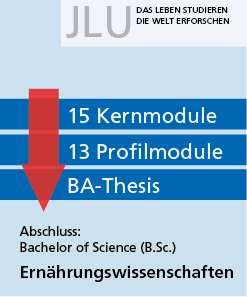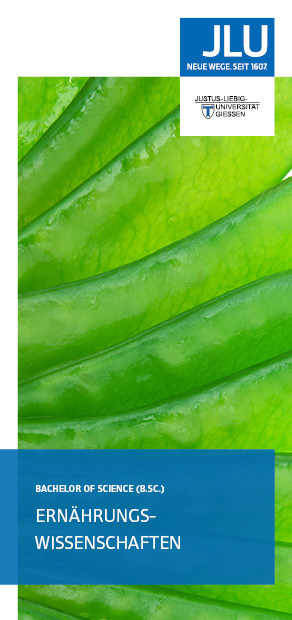Nutritional Sciences (B.Sc.)
Taught in German
Overview
- Overview
-
Contents
What is the composition of food? How do food ingredients affect our bodies? What biochemical processes and mechanisms are behind this? What effects do different forms of nutrition have at the molecular and cellular level? What happens in metabolism and digestion? How is nutrition related to health and disease?
The Bachelor's degree programme in Nutritional Sciences combines findings from modern nutrition research with the disciplines of medicine, food science and public health (promotion of health and prevention of diseases in the population). Natural science fundamentals such as biology, biochemistry and chemistry are as much a part of the programme as physiology, immunology, nutrition therapy and food law.
Practical laboratory exercises will introduce you to the world of research and science. The aim is to be able to transfer scientific knowledge to nutritional practice at the end of the study programme, in addition to the theoretical content learned. In this way, our graduates prove themselves in the area of conflict between industry, food law and medicine and can competently answer nutritional science questions.Subject-specific prerequisites
In addition to the formal entry requirements (see application), we expect an interest in natural sciences as well as in people and social, economic, technological and ecological issues. Basic knowledge of mathematics, chemistry and physics is advantageous. JLU offers preliminary courses in which you can refresh your knowledge before starting your studies. This way you are optimally prepared for your studies
-
Number of enrolled students
435 students are enrolled in this bachelor degree course (as of winter semester 2022/23).
Accreditation
since 28 September 2007.
Composition of the Study Programme
- Degree BSc
-
Degree
Bachelor of Science (BSc)
- Duration of studies 6 Semester 180 Credit Points (CP)
-
Duration of Studies
6 Semesters - 180 Credit Points (CP)
- Composition of the Study Programme
-
Components of the study programme
The programme consists of 17 core modules (compulsory modules) and 11 profile modules (elective modules). Each module has a scope of 6 CP (4 hours per week for one semester) and concludes with a course-related examination. The grades achieved in the individual module examinations result in the final degree grade. In addition, the programme includes a Bachelor's thesis, which is equivalent to 2 modules. This proves that you are capable of independently writing a scientific paper.
Individual profile
The development of an individual profile plays a major role in the degree programme. Our students decide for themselves whether they want to acquire a broad all-round knowledge or prefer to specialise, whether their studies are more practice-oriented or scientific and theoretical. They can choose profile modules from the complete range of courses offered by the Department 09 or even from other departments at JLU.
Practical relevance
In addition to choosing practice-oriented modules, students have the opportunity to complete an internship to gain a first insight into professional life. Module BP 144 "Professional Internship" corresponds to 12 CP and can be chosen as a profile module in all Bachelor's degree programmes of Faculty 09. In this way, students familiarise themselves with the professional world and get suggestions for the individual organisation of their further studies. The Internship Office maintains a database of suitable companies and institutions and supports students in their search for a suitable internship.
Composition of degree programme

The course content is divided into modules. Each module has a scope of 6 CP (4 semester hours per week) and concludes with a course-related examination. The grades achieved in the individual module examinations result in the final degree grade. 17 of the modules are compulsory (core modules), 11 modules are profile modules and can be selected from the entire range of courses offered by the department. The Bachelor's thesis corresponds to the scope of two teaching modules.
Individual specialisation takes place through the choice of profile modules. The degree programme is successfully completed when all modules have been passed.1st semester 2nd semester 3rd emester Biology Basics of biochemistry Nutritional physiology Anatomy and Physiology Food of animal origin Basics of nutrition therapy Plant-based foods Human nutrition Physiology of the gastrointestinal tract
Basics of process technology and thermodynamics Food chemistry, analysis and law Immunological basics for nutritional science General Chemistry Basic Chemistry Practical Age-specific nutrition 4th semester 5th semester 6 th semester Practical course in nutritional science
Specialisation module 4 Specialisation module 9 Statistics and study design Specialisation module 5 Specialisation module 10 Specialisation module 1 Specialisation module 6 Specialisation module 11 Specialisation module 2 Specialisation module 7 Bachelor's dissertation Specialisation module 3 Specialisation module 8 Bachelor's dissertation Specialisation modules
Broad all-round knowledge or specialisation - both are possible. Our students have it in their hands, they put together their studies according to their individual inclinations from the whole range of our offers. In a catalogue of over 80 modules, students can choose profile modules from, for example, the following topics:
- Human nutrition
- Dietetics
- Biochemistry and molecular biology
- Nutritional Medicine and Therapy
- Nutrition and the Immune System
- Food Sciences
- Molecular Nutrition Research
- Communication and counselling
- Nutritional and environmental psychology
- Consumption
- Market theory
- Agricultural, Food and Environmental Policy
- Business Administration
Application
- Commencement of Studies in the Winter Semester
-
Commencement of studies
Only possible in the winter semester
- Entrance Requirements Abitur ohne Praktikumsnachweis
-
Entrance requirements
- Applicants must have an Abitur (German school leaver's examination for university entrance) or equivalent. More on this...
- Certification of a pre-professional practical period is not required.
-
Special regulations apply to foreign applicants or those who gained their university-entrance qualifications abroad. Read more...
- Application limited internally only winter semester
-
Application for admission and registration
- The intake capacity is limited.
- Applications must be received by the JLU Student Secretariat by July 31. More on this...
Please note that the deadline for courses of study that are not limited can be extended. The deadline extensions will be published in the application portal.
- Special regulations apply to foreign applicants or those who gained their university-entrance qualifications abroad. Read more...
- The intake capacity is limited.
Career Options
- Career Options
-
Options for further study at JLU
The following consecutive Master's degree is offered by JLU:
- Ernährungswissenschaften (M.Sc.)
- Nachhaltige Ernährungswirtschaft (M.Sc.)
- Ökotrophologie (M.Sc.)
- Sustainable Transition (M.Sc.) - (taught in english), digital
- Tranistion Management (M.Sc.) - (taught in english)
Additionally, JLU's Faculty 09 offers the following Master's degrees.
Career options
There are opportunities for nutrition science graduates in the food industry, biomedicine and biotechnology, health insurance companies, clinics and other health care companies. They prove themselves in state and private research institutes, in educational institutions, in federal institutes and authorities as well as in international organisations. Areas of responsibility are, for example:
- Clinical nutrition in product development or therapeutic application
- Product development in the food industry
- Quality control in food production
- Product management
- Research and development
- Marketing, press and public relations
- Nutrition counselling
Further Information
- Further Information: Documents
-
PDF documents for the courses of study
- Flyer (in German)
- Study guide (in German)
Examination- and study regulations
- Special regulations (in German)
(with module descriptions and module plans) (in English)
(Please note that only the German version of the modules is offical and legally binding. The english Version is for informative purposes only.) - General study regulations for modular and multi-stage study programmes
Courses offered in the course catalogue
- Electronical course catalogue (in German)
- Bachelor's Degree Programmes of Faculty 09
- International pages
-
Please have a look at our International Pages for more information in English.
- Any Questions
-

Any Questions?
Information- and advisory services of JLU can be found under the category “contact” on this page!
- Help
-
Do you need assistance in choosing the right courses of study?
- Offers: Courses of study
-
Which courses of study suits me best?

Ask Justus offers information for prospective students
Events for prospective students

There is a whole range of events offered by JLU, current events can be found under “news”:
www.uni-giessen.de/studium (in German)
Contact
- Contact
- Subject Advisors
- Central Study Advisor
- Anja Staffler
- Central Student Services
-
- Students office →
(for formal matters like matriculation) - Central student advisory office
(advice for students & prospective students) - Hotline Call Justus
(first contact for all matters pertaining to studies) - International office →
(for international students)
- Students office →

